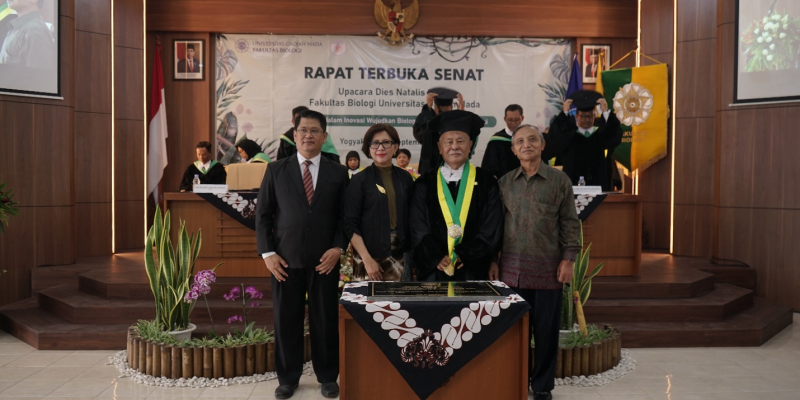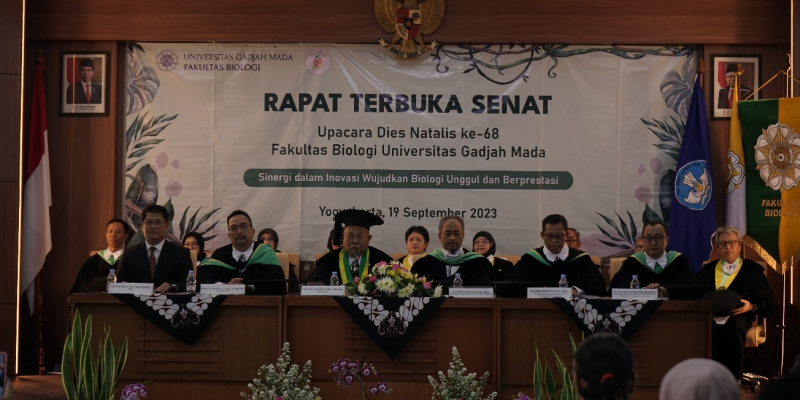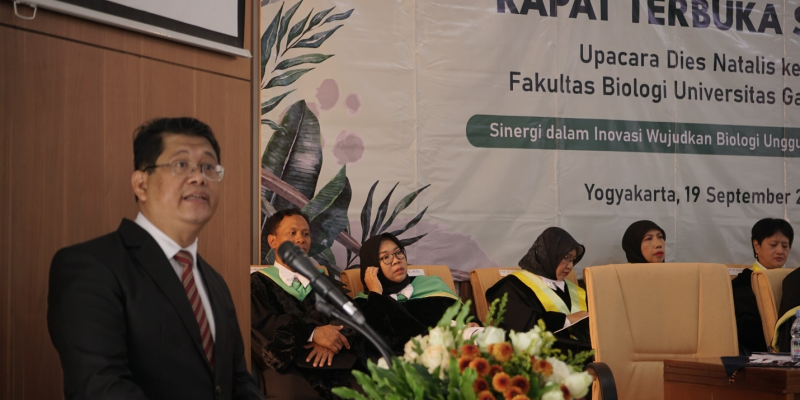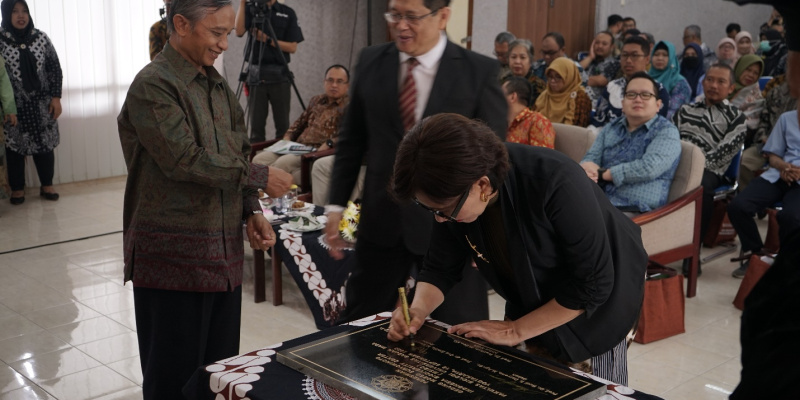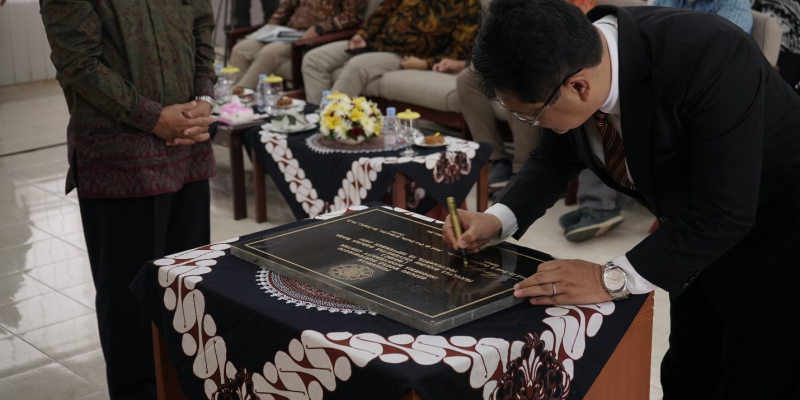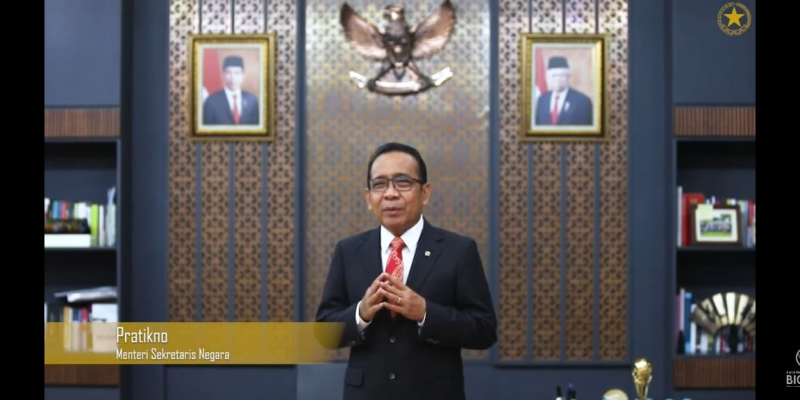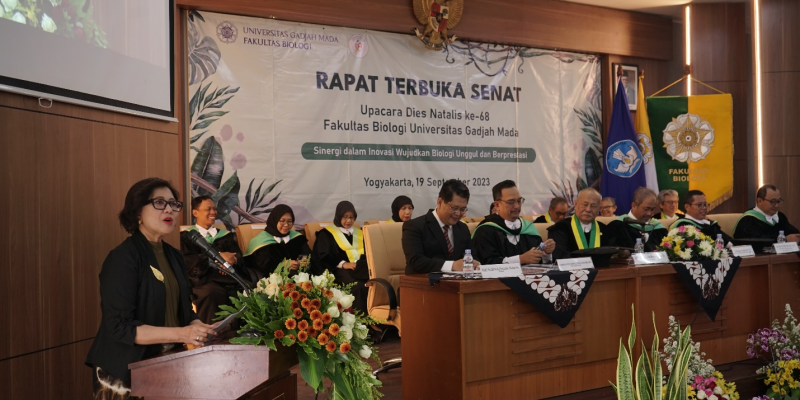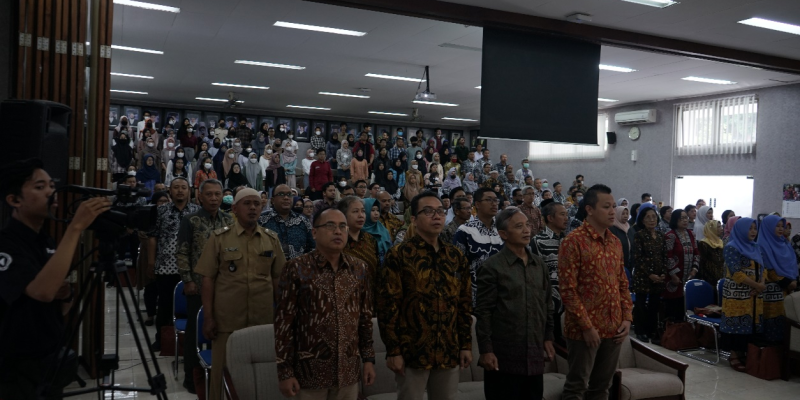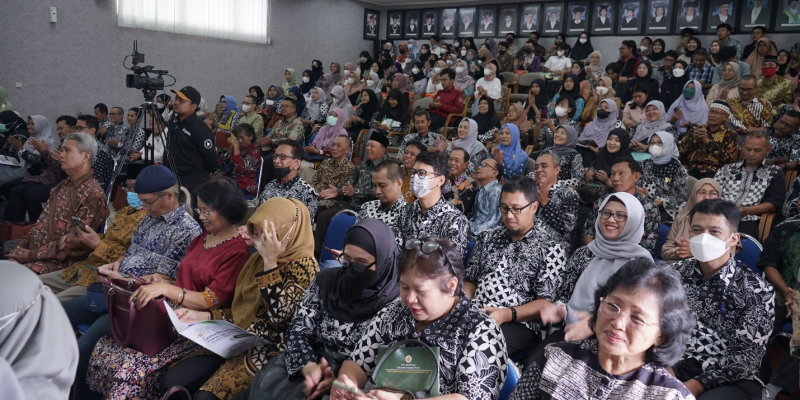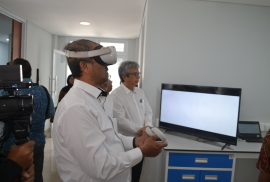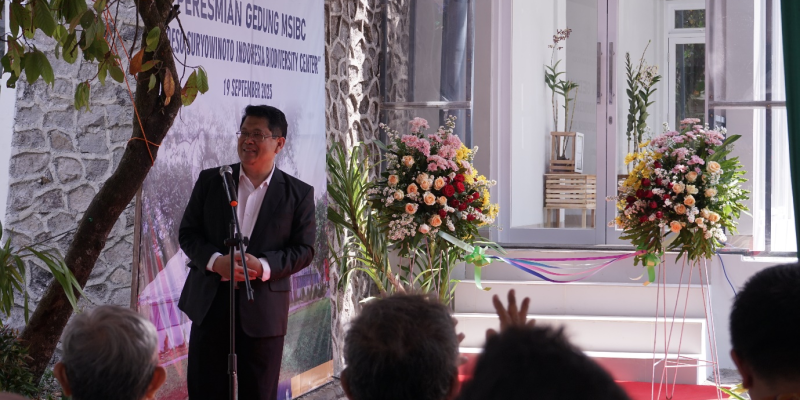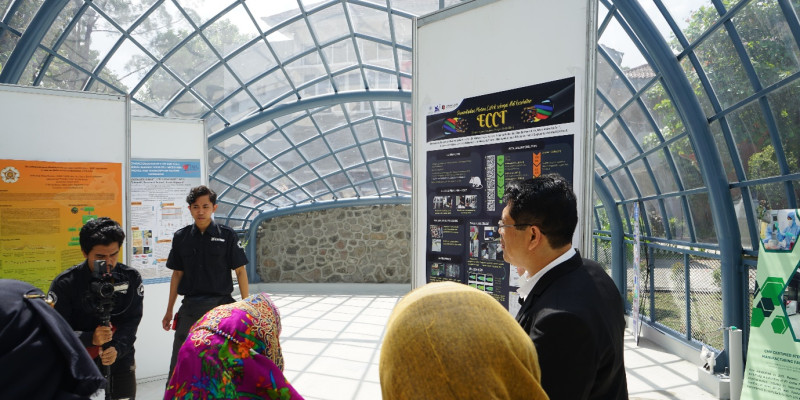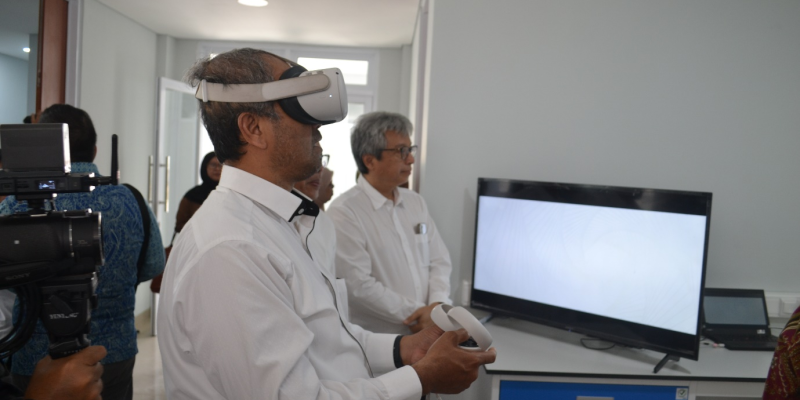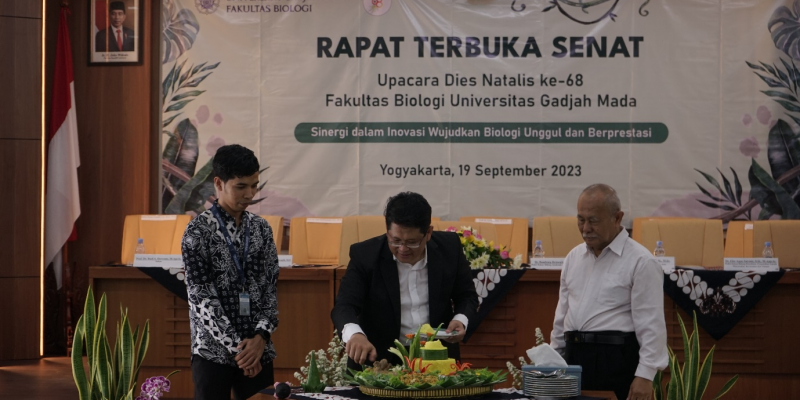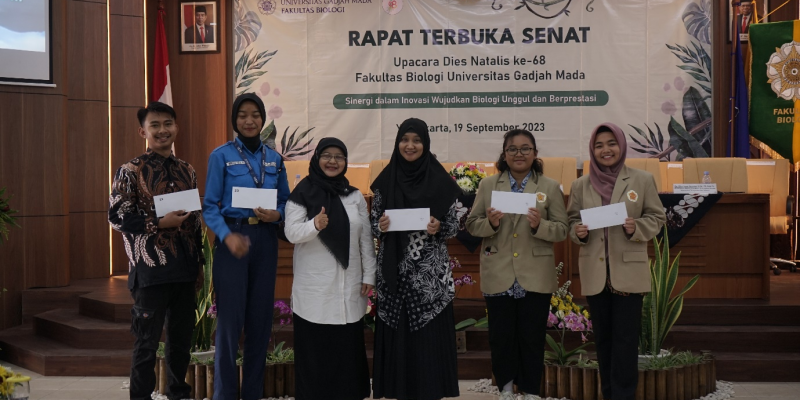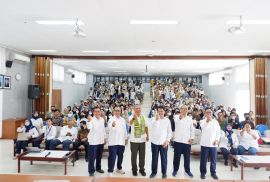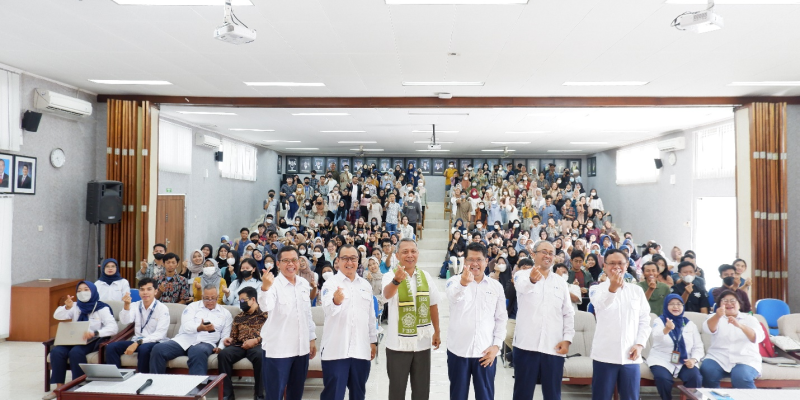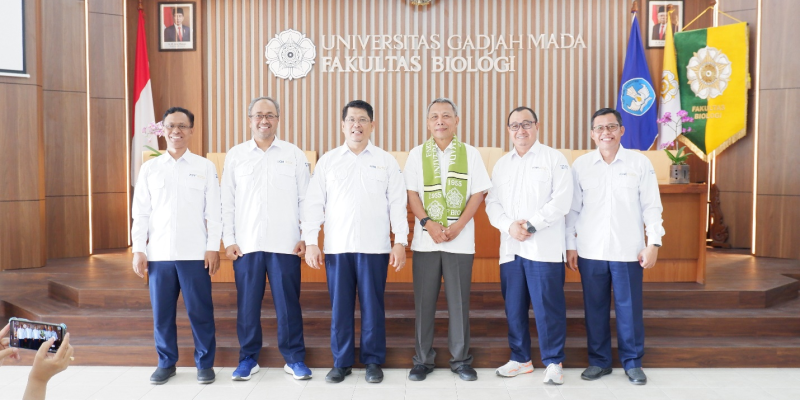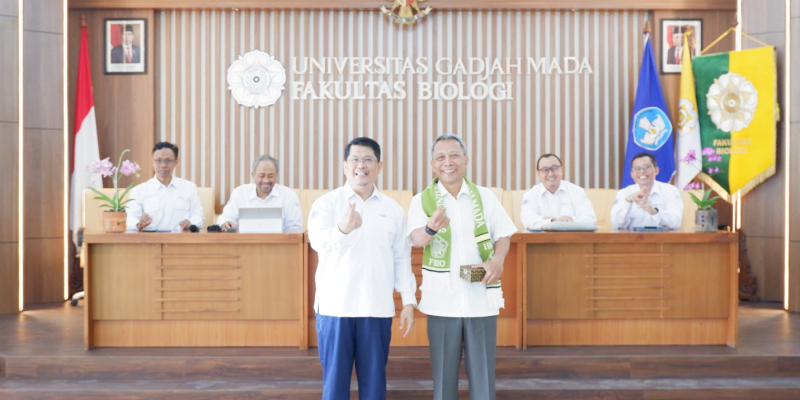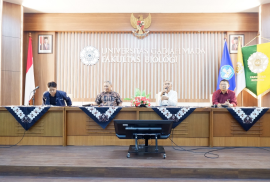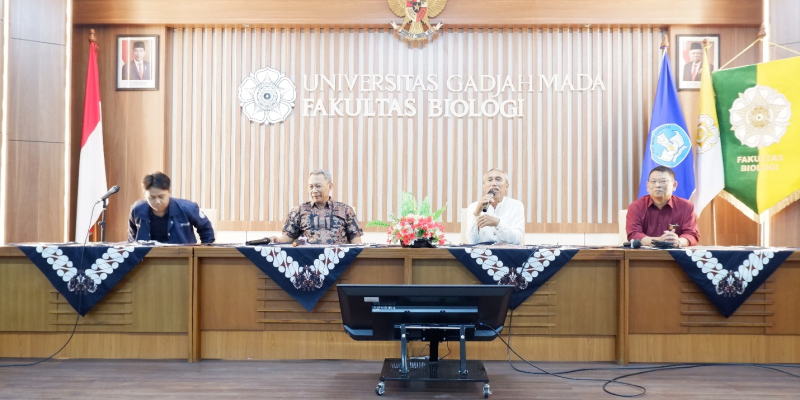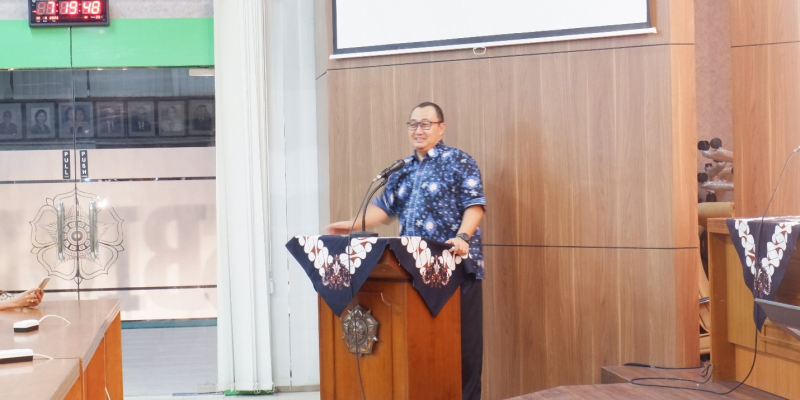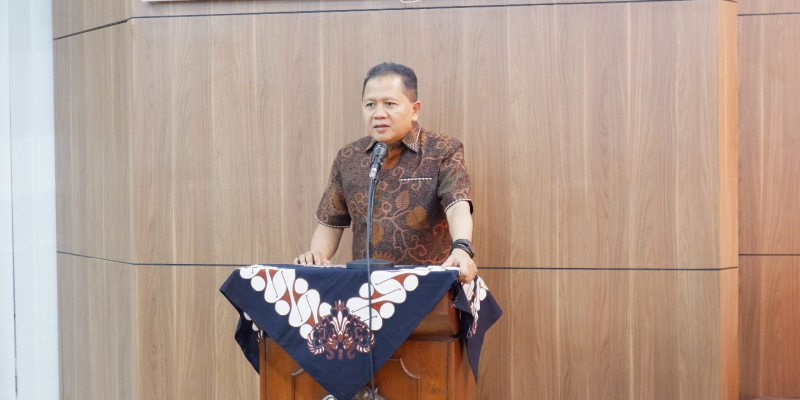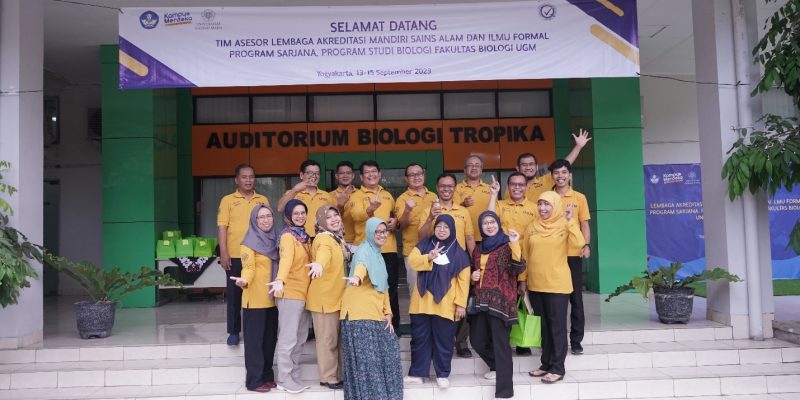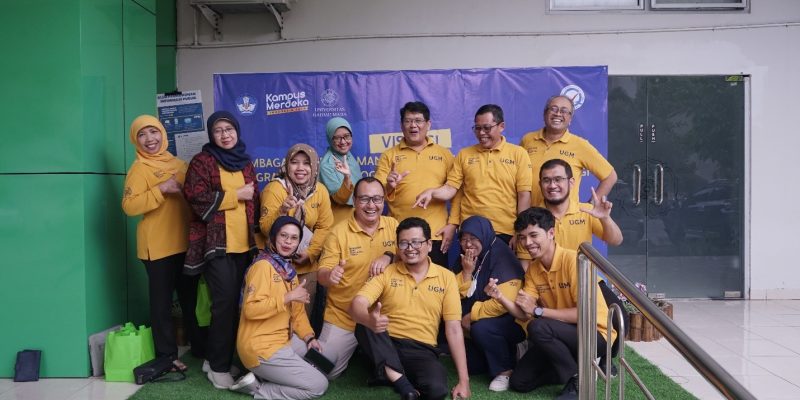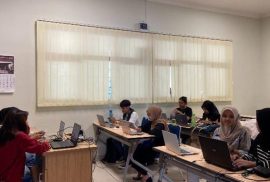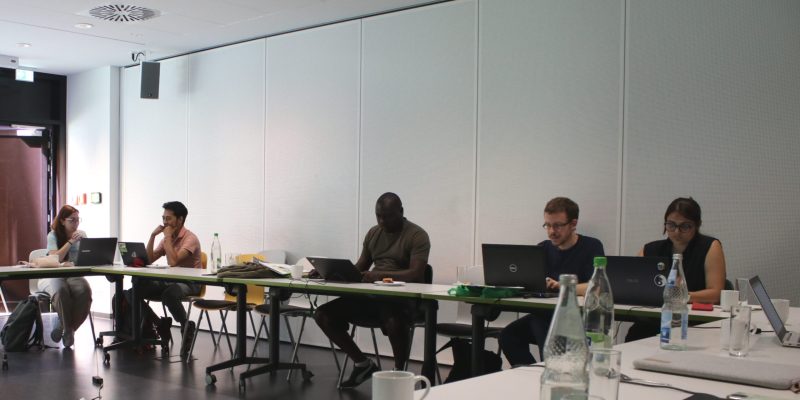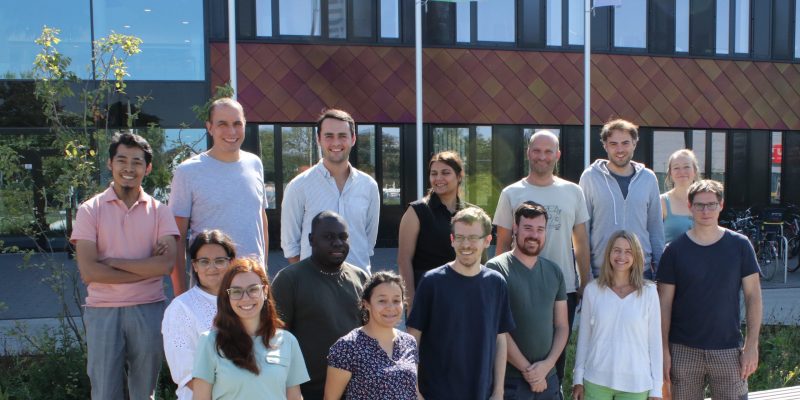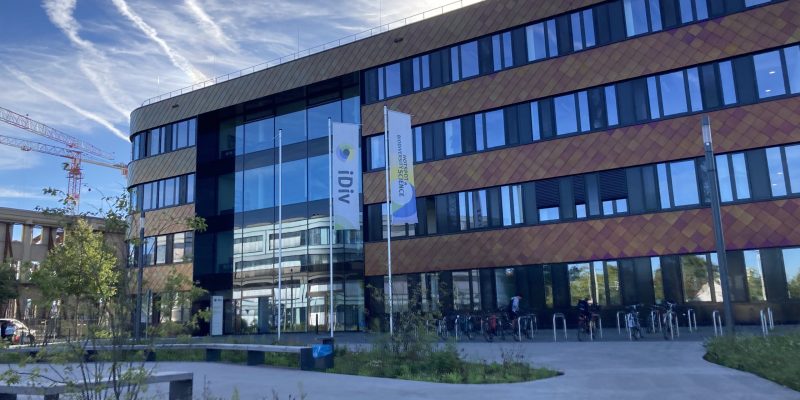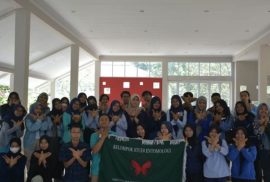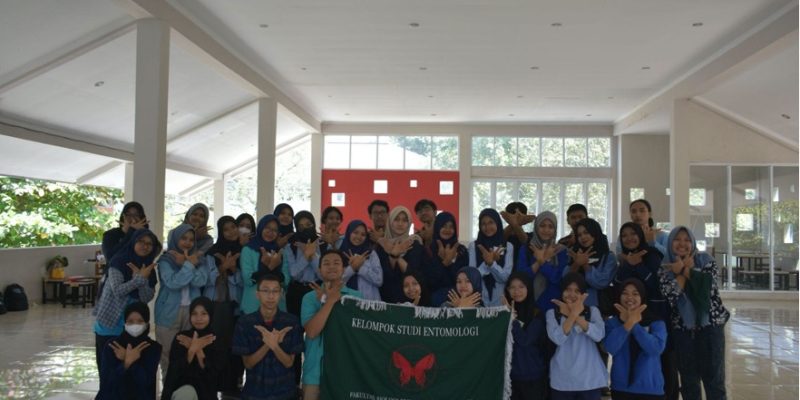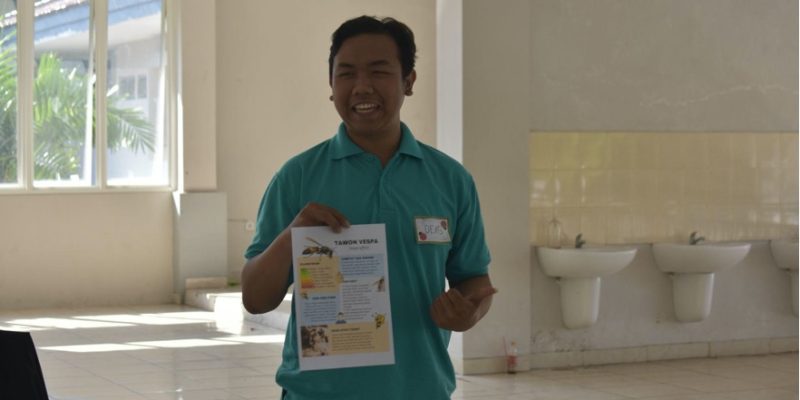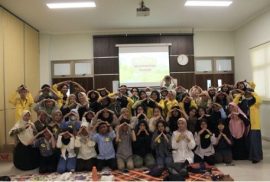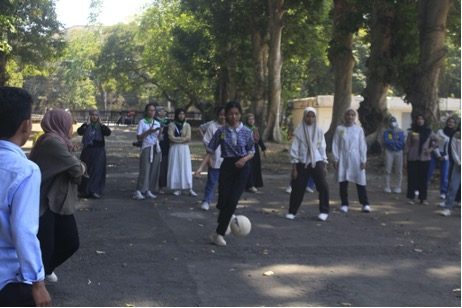Arsip:
News Release
Yogyakarta, 19 September 2023 – Faculty of Biology UGM held the 2023 Senate Open Conference at the Tropical Biology Auditorium with the title “Synergy in Innovation to Create Superior and Achievement Biology”. The Senate Open Conference was also part of celebrations for the 68th Anniversary of the Faculty of Biology UGM. The Conference was attended by the entire academic community of the Faculty of Biology including senate, dean, lecturers, staffs and student representatives, as well as invited guests, alumni, partners and Dharma Wanita Faculty of Biology UGM.
Prof. Dr. Suwarno Hadisusanto, S.U. as Chair of the Faculty of Biology UGM Senate opened the Senate Conference and continued with singing the national anthem “Indonesia Raya”, followed by “Hymne Gadjah Mada”, and “Biology March” as well as a joint prayer led by Tyas Ikhsan Hikmawan, Ph.D.
Prof. Dr. Ova Emilia, M.Med. Ed., Sp.OG (K), Ph.D., Chancellor of Universitas Gadjah Mada also attended the Senate Open Conference and delivered her opening remarks. “There is great potential for support from biological sciences to support various sectors such as health, agriculture, food and other advanced products. “The presence of technology that disrupts life also influences and encourages various innovations, including new biotechnology and biomolecular studies,” said Prof. Ova in her speech (20/9). The UGM Chancellor also said that the phenomenon of future technological development requires us to be open in scientific development so that collaboration across scientific disciplines is necessary for innovation leaps in the future.
The signing of the inscription for the inauguration of the MSIBC (Moeso Suryowinoto Indonesia Biodiversity Center) Building was then carried out. The signing was carried out by the Chancellor of UGM, Prof. Dr. Ova Emilia, M.Med. Ed., Sp.OG (K), Ph.D. and Dean of the Faculty of Biology, Prof. Dr. Budi Setiadi Daryono, M.Agr.Sc., accompanied by Prof. Chairil Anwar from the Board of Trustees UGM and Prof. Dr. Suwarno Hadisusanto, S.U. as Chair of the Senate Faculty of Biology UGM.
Prof. Dr. Budi Setiadi Daryono, M.Agr.Sc. as Dean of the Faculty of Biology then delivered his remarks as well as the Annual Report of the Faculty of Biology UGM. He explained that the Faculty of Biology has demonstrated its position on the international stage, demonstrated by obtaining ASIIN accreditation since 2018 and successfully maintaining its position at 501-550 in the world for Biological Science, as well as the best in Indonesia based on the QS World Ranking. The Faculty of Biology has also carried out visitations for ASIIN reaccreditation for Bachelor’s degrees and ASIIN accreditation for Master’s programs, and is being prepared for ASIIN accreditation of Doctoral programs in 2024. In 2023, the Biology Faculty has graduated 3 students from the International Undergraduate Program which has been accepting students since 2019.
“Biology as a branch of science continues to develop following the stages of the industrial revolution. One of the instruments is metaverse which relies on more complex system applications such as AI, virtual reality, augmented reality,” Prof. Budi added in his speech (20/9). He also highlighted the multi-dimensional crisis due to climate change and global political dynamics. The development of biology towards the metaverse will be a great opportunity in overcoming this problem. This is also in line with support for the achievements of the Sustainable Development Program (SDGs), especially in improving the quality of inclusive education (SDG 4), handling climate change (SDG 13), preserving ecosystems on land and water (SDG 14 and SDG 15).
In his annual report, the Dean of the Biology Faculty also highlighted international exposure which was greatly increased during this period as an effort for the Biology Faculty to become internationally known and improve student experience. This is demonstrated by exposure in the form of student exchange activities and double degrees for undergraduate, postgraduate and doctoral programs.
Improving the quality of education in accordance with SDG 4 is also demonstrated by the plan to open the Bachelor to Masters Fast Track Program and the Life Curator Professional Study Program (PKKH). Prof. Budi also conveyed student achievements including 50 national level achievements and 4 international level achievements in this period, as well as the Faculty of Biology which has the first Biotechnology Competency Test Center (TUK) in Indonesia in collaboration with LSPS and BNSP. Also presented were financial reports, improvements in infrastructure and facilities to support the tri dharma of higher education including the MSIBC Building which was launched on the same day as the Senate Open Conference, an organic waste management program which was participated in by various groups as an effort to create an environmentally friendly campus and support the implementation of SDGs, especially in improving the quality of healthy life (SDG 3).
Next, we presented the achievements of research studies, international publication achievements of Faculty of Biology lecturers, and the development of journals published by the faculty, including the Journal of Tropical Biotechnology and Biodiversity (JTBB) which is indexed by Scopus Q4 and the Berkala Ilmiah Biologi which already has an ISSN. Data on increasing community service and cooperation at both international and national levels, visiting professors and alumni activities were also presented. Prof. Budi also conveyed the implementation of the 7th National Tropical Biology Seminar and the 6th International Summer Course on Tropical Biodiversity and Sustainable Development which were attended by hundreds of participants from various institutions and countries.
The next scientific speech was delivered by Prof. Dr. Pratikno, M.Soc.Sc., Minister of State Secretary of the Republic of Indonesia and Chair of the Board of Trustees Universitas Gadjah Mada. “Biology studies have great potential. Indonesia is rich in natural resources, vast areas, extraordinary biological riches” Prof. Pratikno started his scientific speech (20/9). Prof. Pratikno highlighted future challenges in the form of a food crisis and increasing food needs in line with the increase in population, especially in third world countries with population growth above one percent. Increasing food production capacity needs to be done to avoid hunger in the future, but this is faced with the challenges of decreasing the amount of agricultural land, climate change, long droughts, rising sea levels which can cause crop failure. He conveyed that the role of biology is very vital in the use of technology to overcome these challenges. The use of alternative energy, namely bio-energy such as bio avtur and bio diesel, is considered to be able to support a green economy to reduce emissions and environmentally friendly sustainable development.
Prof. Pratikno then said that the contribution of biology to human health stems from the closeness of the study of biology to medicine at the time of its founding. The development of health science towards precision medicine, which aims to increase the accuracy of diagnosis for each individual, places biological science as central along with medical science. Initiation of the development of biomedical science as an initial embryo involving various scientific disciplines within it and continuing to develop towards leading technology including involving the use of AI, VR and management of Big Data in the form of a bio-repository.
“Biology has a central role in developing research and knowledge in various fields, food, energy and biomedicine,” said Prof. Pratikno when ending his scientific speech. He stated that biology is a science that continues to develop and can become a vital science in Indonesia’s progress.
The Senate Open Conference ended with a closing remarks by the Senate Chair of the Faculty of Biology, Prof. Dr. Suwarno Hadisusanto, S.U. It is hoped that the Open Conference as part of the celebration of the 68th Anniversary of the Faculty of Biology can trigger the enthusiasm of the academic community so that the Faculty of Biology can continue to develop and provide benefits to the nation and state.
Yogyakarta, September 19, 2023 – The Faculty of Biology at Gadjah Mada University (UGM) celebrated its 68th Dies Natalis with a meaningful event. The occasion began warmly with an opening speech by the Dean of the Faculty of Biology UGM, Prof. Dr. Budi Setiadi Daryono, M.Agr.Sc., who also led the soft launching of the Moeso Suryowinoto Indonesia Biodiversity Center (MSIBC) building.
The MSIBC building stands as a symbol of the Faculty of Biology UGM’s commitment to biodiversity conservation and biomedical in Indonesia. In his address, Prof. Budi explained the history of the building’s development and emphasized that it embodies the spirit of the UGM Faculty of Biology community to continue the mission of the late Prof. Ir. Raden Mas Moeso Suryowinoto, the founder of Indonesia’s first plant biotechnology laboratory in 1974. Prof. Ir. Raden Mas Moeso Suryowinoto was a dedicated figure in the development of plant biotechnology through tissue culture. The MSIBC building will also serve as the office for the Center for Tropical Biodiversity (Centrobio).
The inauguration of MSIBC was guided by Angellia Melliana Pramesthi, S.Si., and attended by various important guests from the Faculty of Biology’s partners, as well as the family of Prof. Ir. Raden Mas Moeso Suryowinoto. The atmosphere was filled with emotion during this moment, as a tribute to the long journey in advancing the field of biology in Indonesia.
Following the inauguration, the event continued with a prayer and a ceremonial at the Auditorium of Tropical Biology in the Faculty of Biology UGM, led by Faya Nur Annisa Damantya, A.Md.Sek., and Asrindon, S.I.Kom. Subsequently, mementos were presented to retiring faculty members and education staff as a token of appreciation for their contributions to the development of the faculty.
The event proceeded with the announcement of scholarship recipients from the profits of Jasmine Corner, a canteen managed by the Dharmawanita of the Faculty of Biology UGM. Two fortunate students received these scholarships as support for their education. Additionally, awards were given to outstanding students and the best education staff who have made extraordinary contributions to campus development.
The 68th Dies Natalis competitions at the Faculty of Biology UGM were also successfully held, and winners from various categories such as solo vocal, lively movements, and short films were proudly announced.
As part of the celebration, the Satriabudi Dharma Setia Foundation (YSDS) made a valuable contribution of Next Generation Sequencing (NGS) equipment and consumables worth 2 billion Indonesian Rupiahs. This marks a significant step in accelerating genomic and biomedical technology in Indonesia, aligning with the Sustainable Development Goals (SDGs) of achieving good health and well-being (SDG 3), quality education (SDG 4), and industry, innovation, and infrastructure (SDG 9). Notably, the Indonesian Orchid Association (Perhimpunan Anggrek Indonesia or PAI) from Bangka Belitung also contributed by providing 150 Vanda hookeriana orchid seedlings, endemic to Bangka Belitung, to be nurtured within the Faculty of Biology UGM, contributing to the preservation of Indonesia’s flora diversity (SDG 15).
The highly anticipated moment came with the distribution of door prizes to lucky participants, with a total of 99 door prizes prepared. All participants came together in a warm and harmonious atmosphere during the closing moments of the event.
The 68th Dies Natalis of the Faculty of Biology UGM was not just a celebration but also a reminder of the strong commitment to contribute to biodiversity preservation, the advancement of biological sciences, and quality education. Happy 68th anniversary, Faculty of Biology UGM! May the spirit and vision for a better future continue to thrive.
Yogyakarta, September 18, 2023 – In commemoration of the 68th anniversary of the Faculty of Biology at Gadjah Mada University (UGM), a special edition public lecture was held with an inspiring theme: “The Role of Kabiogama Alumni in Advancing Community Empowerment in East Kalimantan.” This event successfully attracted more than 200 enthusiastic participants who engaged in a discussion rich with experiences and insights.
The event began with a warm welcome from Prof. Dr. Budi Setiadi Daryono, M.Agr.Sc., the Dean of the Faculty of Biology at UGM. Prof. Budi Setiadi Daryono expressed his gratitude to Drs. Lalu Fauzul Idhi, M.Si., an alumnus of the Faculty of Biology at UGM from the class of ’80 and the founder of Woody Park Borneo, who also serves as the Chairman of KAGAMA East Kalimantan. Prof. Budi mentioned, “This is a special guest lecture because tomorrow morning we will be celebrating the anniversary of the Faculty of Biology at UGM, and if it weren’t for his love for his alma mater, it would have been difficult to invite Mr. Fauzul Idhi due to his busy schedule.”
In this inspiring guest lecture, Drs. Lalu Fauzul Idhi, M.Si., explained the crucial role of Kabiogama alumni in developing community empowerment in East Kalimantan. He elaborated on various initiatives and projects undertaken by alumni of the Faculty of Biology at UGM in the region. One of the primary efforts is to support the achievement of the 17 Sustainable Development Goals (SDGs), ranging from addressing poverty to creating partnerships for sustainable development.
UGM alumni in East Kalimantan have been actively involved in various activities, including Inclusive Villages, the EcoPrint Academy, the Indonesian Water Harvesting Movement, grape cultivation, bamboo cultivation for ecotourism, coffee cultivation, and much more. All of these activities are carried out with the goal of developing villages and local communities, including the establishment of a Tempat Uji Kompetensi (TUK) for agriculture.
In conclusion, Mr. Fauzul Idhi shared the motto that inspires UGM alumni: “Garda Terdepan Beramal Nyata, Benteng Negara Indonesia.” This reflects their commitment to being active agents of change in advancing society and the nation.
This public lecture served not only as a platform for sharing experiences and inspiration but also as a moment to celebrate the 68th anniversary of the Faculty of Biology at UGM. The enthusiasm and increased participation of alumni in community development and environmental conservation further solidify the Faculty of Biology at UGM as an institution that supports sustainable development and environmental preservation. Happy 68th Anniversary, Faculty of Biology at UGM! May this spirit of change continue to burn brightly in the hearts of alumni and students.
Yogyakarta, September 16, 2023 – Sarasehan Kabiogama, an event aimed at strengthening the connections among the extended family of alumni from the Faculty of Biology at Gadjah Mada University (UGM), was successfully held on September 16, 2023. The event was attended by 30 participants representing students and alumni from various regions.
The Chairman of the Senate of the Faculty of Biology at UGM, Prof. Dr. Suwarno Hadisusanto, and other faculty leaders, including the Dean of the Faculty of Biology at UGM, Prof. Dr. Budi Setiadi Daryono, M.Agr.Sc., Dr. Slamet Wijayanto, M.Sc. (Vice Dean for Finance, Assets, and Human Resources), Dr. Eko Agus Suyono, M.App.Sc. (Vice Dean for Research, Community Engagement, Cooperation, and Alumni), and Sukirno, S.Si., M.Sc., Ph.D. (Head of the Undergraduate Program at the Faculty of Biology), were present at the event. They provided significant support in building networks between alumni and students.
The event began with a welcome address by Dr. Eko Agus Suyono, M.App.Sc., Vice Dean for Research, Community Engagement, Cooperation, and Alumni. It was followed by remarks from Drs. Heri Susanto, S.Si., MM., the Secretary-General of the Central Executive Board (PP) of Kabiogama, guided by Dra. Hj. Yundaru Nurantini.
The core of the event consisted of a discussion led by Drs. Lalu Fauzul Idhi, M.Si., Chairman of KAGAMA East Kalimantan, Drs. Ario Setra Setiadi, MM., Ph.D., CPM., ACIM., Chairman of the PP of Kabiogama, Drs. M. Husain Kassim, M.P., Head of the Organization Division of the PP of Kabiogama, and Yusril Ihza Farhan Wijaya, S.Si., Chairman of the Graduate Student Family of the Faculty of Biology at UGM.
The discussion addressed the crucial issue of building relationships between Kabiogama and actively enrolled students who are also future potential Kabiogama members. This effort is not only aimed at strengthening the alumni network (SDGs 17) but also at enhancing the potential of students in managing and improving their capabilities during their academic journey and after graduation.
Kabiogama emphasized the importance of Background Checking in the job application process. The involvement of alumni in programs organized by students, and vice versa, will support students in their future job searches. This is a vital step in bridging the gap between the world of education and the job market, which often presents its own set of challenges.
Furthermore, this event also encouraged current students to start developing relations and networks outside of the Faculty. This will assist them in broadening their horizons, gaining valuable experiences, and preparing for post-graduation employment and economic growth in line with SDGs 8.
This year’s Sarasehan Kabiogama serves as tangible evidence that the alumni community of the Faculty of Biology at UGM is deeply concerned about education and the development of students. With a collaborative spirit between alumni and students, every career development activity for students in the future will always be guided and supported by Kabiogama.
YOGYAKARTA, September 15, 2023 – The Faculty of Biology at Gadjah Mada University (UGM) received a visitation from assessors of the Independent Accreditation Agency for Natural Sciences and Formal Sciences (LAMSAMA) to conduct the accreditation field assessment process for the undergraduate program. The visitation and assessment took place over two days, commencing on Thursday and concluding on Friday, September 14-15, 2023.
This accreditation process signifies the Faculty of Biology’s ongoing effort to enhance the quality of higher education provided to students. The success of this process is inseparable from the outstanding support provided by all elements of the Faculty of Biology, including faculty members, educational staff, students, as well as external parties such as alumni, graduate users, and partners. Dean of the Faculty of Biology at UGM, Prof. Dr. Budi Setiadi Daryono, M.Agr.Sc., stated, “We want to express our utmost gratitude to all elements of the Faculty of Biology, who have provided full support during the preparation and implementation of this visitation. This is a crucial moment in our journey towards improving the quality of education, and we are proud of the cooperation and dedication of all parties involved.”
This visitation encompasses a comprehensive evaluation of various aspects of the undergraduate program at the Faculty of Biology, UGM, including the curriculum, academic atmosphere, teaching methods, laboratory facilities and infrastructure, research, as well as various support services provided to students. LAMSAMA, as a leading institution in the field of accreditation for natural and formal sciences, will play a crucial role in ensuring that high-quality standards are maintained.
On Saturday, September 9th, 2023, the Semifinal Round of the Biology Brainiac Competition was held by the Biosphere#6 Committee via Zoom Meeting, with a total of 20 teams participating. This semifinal round is part of the Biology Brainiac Competition event that will lead participants to the Final Round. During this semifinal round, participants tackled a set of 100 questions, comprising multiple-choice, multiple-answer, and cause-and-effect analysis questions. The questions were answered online through a link provided by the committee via each team’s email. The duration for completing the questions was capped at a maximum of 180 minutes per session. The activity commenced at 9:00 AM (WIB) for Zoom access and participant attendance. Before starting, the committee briefed participants on the question-solving process to prevent any hitches. The question-solving phase then ran from 9:00 AM to 12:50 PM (WIB).
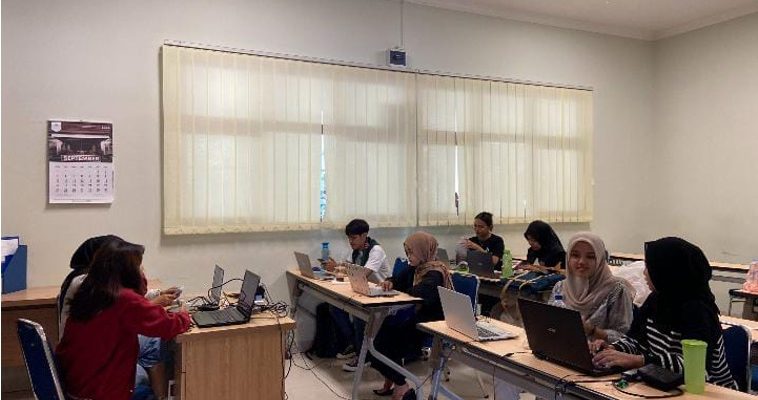
Throughout the question-solving period, all participants were required to keep their cameras active from start to finish. The committee maintained vigilance over the participants to ensure there was no foul play. The preliminary round of the Biology Brainiac Competition concluded with a documentation session and closing remarks.From this preliminary round, the top-performing teams will advance to the final round. Ten teams with the highest scores will be selected to compete in the final and grand final rounds, which will be conducted online on September 23rd, 2023.
The aspiration behind organizing the Biology Brainiac Competition is to provide a pathway for all students in Indonesia to learn and strive towards achieving their dreams and aspirations in furthering their education. It aims to empower them to continually optimize their potential through active participation and excellence.
Mukhlish Jamal, a lecturer at the Laboratory of Ecology and Conservation, Faculty of Biology, Universitas Gadjah Mada, was recently chosen to represent his institution at an international event. He participated in a week-long summer school organized by the German Center for Integrative Biodiversity Research (iDiv), a leading institution in Leipzig, Germany, from September 4th to 8th, 2023.
This iDiv summer school was attended by seven selected participants from various parts of the world, including countries like Mexico, Brazil, Ukraine, the Republic of Congo, India, Germany, and of course, Indonesia. These participants came from different stages in their academic and professional careers, ranging from advanced doctoral students to assistant professors. This diversity added a unique value to the learning environment, encouraging cultural exchange and interdisciplinary collaboration. The main focus of this intensive summer school was to equip participants with advanced strategies in modeling complex ecological networks and provide a profound understanding of the economic dimensions in natural resource management. Through intensive sessions, participants delved into the intricacies of modeling how human behavior influences resource extraction. These models were designed to synthesize data, yielding a comprehensive understanding of the integrated dynamics between ecological stability (including factors such as species sustainability, community biomass, and ecosystem functions) and sustainable economic outcomes (such as biomass harvest yields, generated income, and employment opportunities).
The curriculum of this course consisted of a combination of lectures, seminars, and collaborative group work, ensuring a holistic learning experience. Leading this academic journey were two renowned professors in their respective fields: Prof. Ulrich Brose, Head of the iDiv Research Group, Theory in Biodiversity Science, bringing his extensive expertise in ecological network modeling, and Prof. Martin Quaas, Head of the iDiv Research Group Biodiversity Economics, sharing valuable insights on the economic aspects of biodiversity. Guided by these leading professors, Mukhlish Jamal and fellow participants also had the opportunity to collaborate with researchers from their respective research groups, providing a practical dimension to their theoretical knowledge.
Through initiatives like the iDiv summer school, institutions such as Universitas Gadjah Mada and researchers like Mukhlish Jamal continue to contribute to the global effort to address crucial issues related to biodiversity conservation and sustainable natural resource management.
On September 12, 2023, the Faculty of Biology at Gadjah Mada University (UGM) and the Ecology and Conservation Laboratory hosted a Hybrid Seminar titled “Nature-Based Solutions for Managing Tropical Coastal Ecosystems for Human Well-being” at the Tropical Biology Auditorium. The event commenced with opening remarks from the committee chair, Dr.rer.nat Andhika Puspito Nugroho, and was inaugurated by the Dean of the Faculty of Biology, Prof. Budi Setiadi Daryono, M.Agr.Sc. This seminar was organized to commemorate the retirement of Prof. Tjut Sugandawaty Djohan, who has made invaluable scientific contributions over nearly 40 years of work at the Faculty of Biology, UGM. Furthermore, this seminar coincided with Prof. Tjut’s birthday, serving as a testament to the immense appreciation for her countless contributions to the development of ecology and conservation science.
The theme was chosen in response to the ecosystem degradation occurring in various regions worldwide. Ecosystems within landscapes and coastal areas provide essential services supporting human life, including the supply of clean water, food, clean air, as well as aspects of culture and sustainable spirituality. The unprecedented level of ecosystem degradation prompted the United Nations to declare 2021-2030 as the UN Decade on Ecosystem Restoration, advocating for global-scale ecosystem restoration programs. Additionally, the reciprocal relationship between human well-being and ecosystem health continues to be fostered, one such avenue being Nature-Based Solutions (NBS). NBS is an approach integrating ecosystem-based management principles as solutions to human challenges in the Anthropocene era. Moreover, it is expected that NBS-related topics will contribute to the achievement of Sustainable Development Goals (SDGs).
The hybrid seminar, attended by nearly 220 participants both physically and virtually, comprised two main sessions: keynote speakers and invited speakers. In the keynote session, Prof. Tjut Sugandawaty Djohan from the Faculty of Biology, UGM, addressed the theme “Ecosystem Degradation in Tropical Landscape-Coastal Areas and Climate Emergency,” while Prof. Jatna Supriatna from the Indonesian Academy of Sciences (Research Center for Climate Change) discussed “Ecosystem Services Potential for Carbon Trading.” Following this, Dr. Barano Siswa Sulistyawan from the Global Environment Facility-RIMBA, Ministry of ATR/BPN, spoke on “Realizing the RIMBA Landscape Corridor through Green Economy.”
In the invited speakers session, individuals mentored by Prof. Tjut shared their experiences. These included Dr.Ir.Aji Ali Akbar, S. Hut, M. Si (Tanjungpura University), Gemasakti Adzan, M.Sc. (World Resources Institute Indonesia), Dr. Rossie Wiedya Nusantara (Tanjungpura University), Dr. Karyadi Baskoro, M.Si. (Diponegoro University), Achmad Ariefiandy, M.Phil. (Komodo Survival Program), Sugotowikan (Ateliers Francois S.A.), Dr. Sudaryanto (Udayana University), Willem Amu Blegur, M.Sc (Timor University), Arief Rachman, M.Sc. (National Research and Innovation Agency), Ryannika Dwi Astuti, S.Si. (LINI Foundation).
This event is envisioned as a platform for sharing experiences, knowledge, networking, and inspiring the younger generation to venture into the field of ecology and conservation. Given that the younger generation is instrumental in addressing current and future environmental challenges, the committee and Prof. Tjut express gratitude to all the speakers and participants who attended from various regions in Indonesia, encompassing diverse professional backgrounds including academia, scientists, students, and conservation practitioners. “The spirit and enthusiasm displayed in this event motivate us to continue our efforts in preserving nature and supporting sustainability,” concluded the Committee Chair.
Yogyakarta, Saturday, September 9, 2023 – The Entomology Study Group (ESG) held the third event in its Open Recruitment series, known as the First Gathering. The purpose of this gathering was to welcome the new members of ESG XXV and facilitate introductions among ESG members. The event took place at the BioGeo cafeteria on the second floor, from 07:30 to 11:00 AM, and was attended by active ESG members and the new members of ESG XXV. The First Gathering event was led by Regina Nilamsari (ESG XXIV).
It commenced with a welcome address from the ESG chairman, Cornelius Devito Deva (ESG XXII), followed by introductions from the new ESG members and the active ESG members. Additionally, there was an introduction to the eight divisions within the Entomology Study Group: secretary, treasurer, entrepreneurship, HR development, research, networking, media information, and curriculum-research. The activities proceeded with poster presentations on insects liked and disliked by the new members, showcasing their creativity.
The new members showed great enthusiasm in creating and presenting their posters, evident in the captivating results. Following the presentations, there were group activities and quizzes about insects, enthusiastically participated in by all the new members who actively answered the questions posed by the MC. The event concluded with the announcement of the best poster and quiz winners, closing remarks by the ESG chairman, and a documentation session.
On Saturday, September 9, 2023, the Meet and Greet event for prospective KSAT Seedlings took place, as part of the Open Recruitment activities organized by KSAT. This Meet and Greet event serves as an introduction and initial meeting between Active KSAT Members and potential new members. The event was held in person in Room II of Building B. The Meet and Greet aims to introduce KSAT to potential new members and serves as a precursor to the upcoming KSAT spatial training program. The event kicked off with an opening and prayer led by the MCs, Mirmastu Lintu Nirmala W. and Khansa Fauziah Rachman (KSAT 2022).
This was followed by welcoming remarks from the head of the Open Recruitment committee, Anggi Nada Khoirul U. (KSAT 2021), the president of KSAT 2023, Zildan Basara (KSAT 2020), and KSAT advisor, Dr. Wiko Arif Wibowo, S.Si., who was unable to attend. Next, the KSAT slogan was introduced: “KSAT, Rooted Firmly Penetrating Civilization”. Following this, the main session included an introduction to KSAT, covering its activities, work programs, various disciplines within KSAT, as well as the non-disciplinary divisions within KSAT’s organization. This was followed by introductions from each non-disciplinary division to the Young Biologists or Prospective Seedlings. After the main activities concluded, discussions and introductions of the Prospective Seedlings were carried out in four groups, each led by guides Adelia Adriani, Hanifah Trihastuti (KSAT 2021), Ghefira Nur Fatimah, and Tiara Syifa Wididevani (KSAT 2022). Additionally, there were games held on Taman Biologi Street. The Meet and Greet event concluded with a closing prayer and a collective documentation.
The Meet and Greet event ran smoothly and on schedule. With the successful execution of the Meet and Greet event by KSAT Biologi UGM, it is hoped that the prospective KSAT Seedlings will be excited to join KSAT and engage dynamically through the upcoming spatial training activities. Furthermore, it is anticipated that KSAT will further establish its roots firmly in order to effectively penetrate civilization, thus becoming a study group that benefits not only the surrounding environment, but also academics and the broader community.


